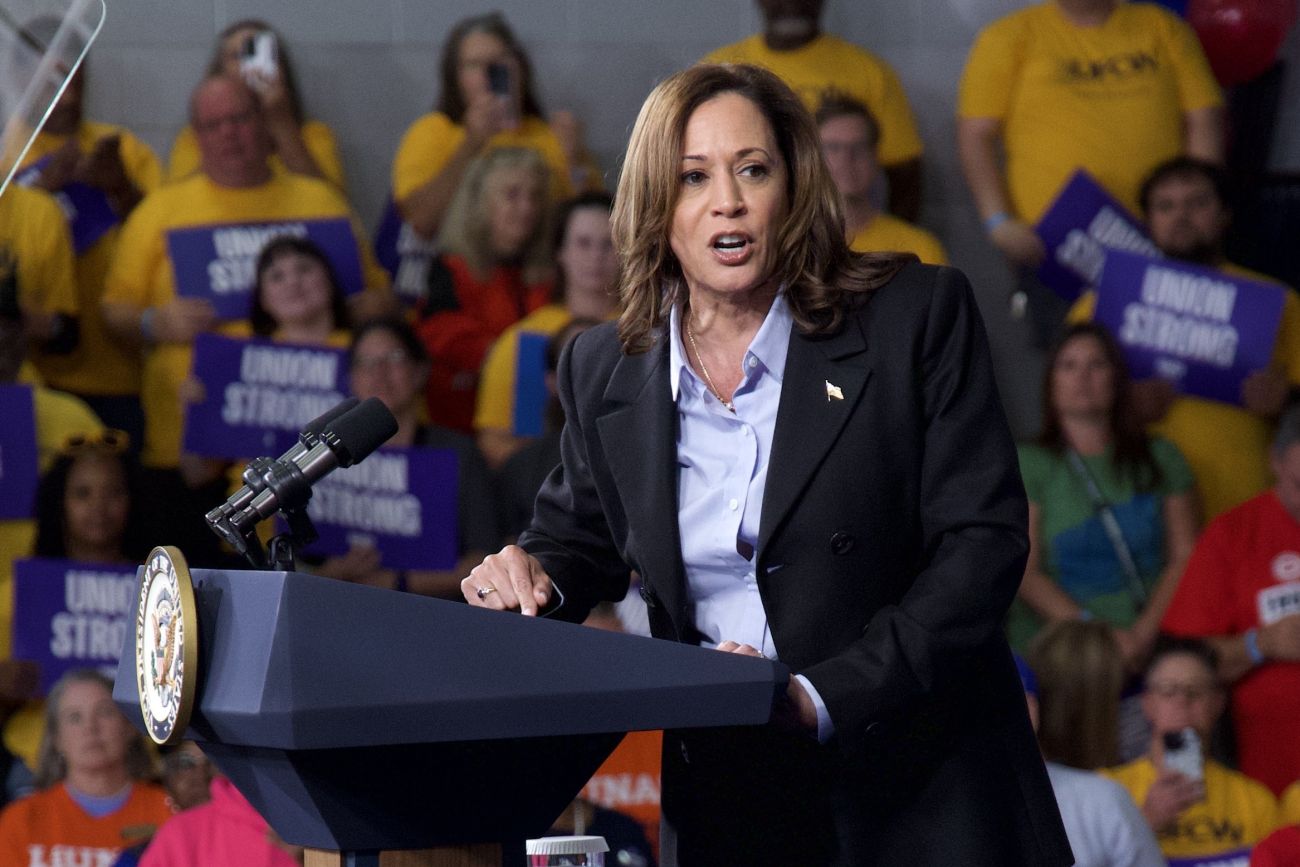Kamala Harris in Michigan: ‘When unions are strong, America is strong’

- Vice President Kamala Harris courted union voters in Detroit on Labor Day, promising ‘we fight for a future where every worker has the freedom to organize’
- Union members are a crucial voting bloc for both parties in the presidential election, as former President Donald Trump has courted working class voters in Michigan stops
- Harris did not address weeks of doomsaying from Republicans who have alleged the current administration’s push toward electric vehicles would hollow out automotive manufacturing jobs
DETROIT — Vice President and Democratic presidential nominee Kamala Harris told union workers Monday, “when unions are strong, America is strong.”
The Detroit visit was part of Harris’ Labor Day swing through battleground states to rally organized labor, a crucial voting bloc for both parties in the November election.
“While we are fighting so much nonsense that is about trying to divide our country, trying to pull us apart, look to what the history and the present of labor tells us about the power of the collective and unity,” Harris told a crowd of several hundred union members gathered in the Northwestern High School gym.
On stage, Harris was flanked by the leaders of five prominent unions, the United Auto Workers’ Shawn Fain, American Federation of Teachers’ Randi Weingarten, Laborers’ International Union’s Brent Booker, Utility Workers Union of America’s James Slevin and the National Education Association’s Rebecca Pringle.
Related:
- Trump in Michigan vows free IVF for all, fight for auto jobs
- Kamala Harris, Tim Walz in Michigan: 'We're not going back' to Donald Trump
- Harris campaign courts social media stars in Detroit
Prominent elected Democrats rallied the crowd ahead of her appearance, including Gov. Gretchen Whitmer.
“What it really comes down to is this, this guy (former President Donald Trump) just doesn't get you or your life at all,” Whitmer told the attendees.
“If your most famous line is ‘you're fired,’ you sure as hell don't understand workers.”
Whitmer leaned on the record of Michigan Democrats — who control state government for the first time in 40 years — to motivate the crowd by noting last year’s repeal of the state’s decade-old “right-to-work” law.
With 64 days until Election Day — and 24 days until ballots are mailed to absentee voters — Harris and Trump are effectively tied in Michigan. Harris told attendees “this is going to be a very tight race to the very end.”
Murky facts on overtime, tariffs
While Harris spoke briefly about her agenda to support organized labor, including championing the PRO Act, which strengthens union organizing protections, and contrasting her own priorities with Trump’s, the speech was largely light on policy.
But where Harris did offer specifics on their agendas, her accuracy was mixed.
Harris claimed on stage, that “Donald Trump blocked overtime benefits from millions of workers.”
The facts don’t support this. In actuality an overtime rule set by former President Barack Obama’s administration — making overtime pay required for workers making up to $47,000 a year — had been blocked by a federal judge in November 2016, and the Trump administration later implemented its own rule in 2019 that was less ambitious. It increased the ceiling for required overtime pay to $35,568, from the then-current $23,000 limit.
So while Trump’s plan was less expensive than Obama’s proposal, it was not the Trump administration that had blocked that effort.
Harris also argued Trump “wants to impose what in effect is a national sales tax on everyday products and basic necessities. … That will cost a typical American family almost $4,000 a year.”
She is referring to Trump’s proposal for aggressive tariffs on foreign-made goods, and economists largely agree that the cost of tariffs is passed along to consumers, though Trump has contended the policies would spur a revitalization in domestic industry.
What’s less clear is the source of the $4,000 cost. The Peterson Institute for International Economics puts the cost at $2,600 for a typical family, and other estimates go lower. But it is clear that costs would rise under his plan.
Defending EVs in the crosshairs
What wasn’t mentioned in Harris’ speech — automotive manufacturing and the transition to electric vehicles — has received an almost singular focus from Republicans on the Michigan campaign trail in recent weeks.
Hours before Harris’ rally, Republicans convened on a call with reporters to assail Harris, via the administration of President Joe Biden, for so-called “EV mandates.”
U.S. Rep. John James, R-Shelby Township, argued Democratic denials about a mandate are false, given the Environmental Protection Agency’s fuel economy standards.
The Biden administration has since relaxed its original fuel economy timeline due to sluggish EV sales, but automakers and regulators alike said the fuel economy targets will require a majority of sales to be electric by 2032.
“These mandates are detached from reality and is going to hurt real people at the expense of not just our energy and our manufacturing dominance, but American national security itself,” James said.
Harris has a “plan to ban gas powered cars” which would “decimate the backbone of our economy,” Michigan Republican Party communications director Victoria LaCivita said in a statement.
“President Donald Trump will return us to an all-of-the-above energy plan, protect Michigan's auto jobs and support American workers,” she added.
Union vote in the balance
Harris walked a picket line with union workers in 2019 and Biden joined United Auto Workers members during their 2023 strike, Democrats have longstanding challenges to regain a broad majority of union voters.
Encouraging the domestic manufacture of electric vehicles has been a major point of Biden’s — and in turn Harris’ — domestic agenda, both for economic growth and the effort to mitigate human-driven climate change.
The United Auto Workers endorsed Biden, and later Harris, and UAW president Fain spoke at the Democratic National Convention. But Teamsters president Sean O'Brien spoke at the Republican National Convention, a first, in July. He had intended to speak to both conventions, but his later request to speak at the DNC was not accepted. The Teamsters have yet to endorse Harris.
It illustrates the split among union leadership and rank-and-file members, whose membership has drifted toward Trump after decades as Democratic stalwarts. According to the Survey Center on American Life, the proportion of white Americans voters in union households who identify as Republicans has increased from 14% in the 1970s to 33% — tied with Democrats for the first time in decades.
Though no public polling of union voters has been released since Harris became the Democratic pick for president, a poll conducted by NBC in February found 43% of union households were supporting Trump, with 50% backing Biden. In the 2020 election, Biden captured just 57% of union households nationwide, and was a key factor in Trump’s 2016 Michigan victory.
Larry Davis, the president of United Auto Workers Local 22 — the union's only remaining local in the city — told Bridge “it’s a different climate” politically and acknowledged there are members that see appeal in Trump.
Still, he considers his local chapter a lock for Harris.
They intend to “counter the message with facts” when it comes to electric vehicles, Davis said. He considers the doomsaying from Republicans “nothing more than a money grab” by Trump at the behest of the oil and gas industries.
Trump has courted donors from the fossil fuel industry, which has drafted executive orders for Trump to sign, should he be reelected. At Trump’s rally in Potterville last week, attendees were handed signs emblazoned with “Drill baby drill!”
In a previous Michigan visit, Trump had asserted if he’s not again elected president all automotive jobs would be gone in three years, and that all electric vehicles would be made in China.
See what new members are saying about why they donated to Bridge Michigan:
- “In order for this information to be accurate and unbiased it must be underwritten by its readers, not by special interests.” - Larry S.
- “Not many other media sources report on the topics Bridge does.” - Susan B.
- “Your journalism is outstanding and rare these days.” - Mark S.
If you want to ensure the future of nonpartisan, nonprofit Michigan journalism, please become a member today. You, too, will be asked why you donated and maybe we'll feature your quote next time!




